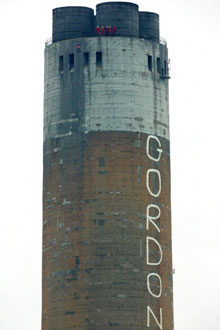The trial of the six Greenpeace UK activists was the first case in which acting to prevent climate change causing damage to property formed part of a 'lawful excuse' defence
On 10 September six Greenpeace climate change activists were cleared of causing criminal damage at a coal-fired power station in a verdict that is expected to embarrass the government and strengthen the anti-coal movement.
The jury of nine men and three women at Maidstone crown court cleared the six, five of whom had scaled a 200m tall chimney at Kingsnorth power station at Hoo, Kent in October 2007.
The activists admitted trying to shut down the station by occupying the smokestack and painting the world "Gordon" down the chimney, but argued that they were legally justified because they were trying to prevent climate change causing greater damage to property around the world.
The court had heard from Prof James Hansen, one of the world's leading climate scientists, that the 20,000 tonnes of carbon dioxide emitted daily by Kingsnorth could be responsible for the extinction of up to 400 species.
It was the Erika oilslick trial that set the "ecological prejudice" precedent in January 2008. In a landmark decision, the Criminal Court of Paris condemned the world's fourth largest oil group Total SA to a fine of €375,000 – the maximum allowable penalty for maritime pollution – claiming "ecological prejudice" caused by the sinking of the Erika. It was the first time that a French court handed down a conviction for environmental damage.
Let justice be done.








No comments:
Post a Comment